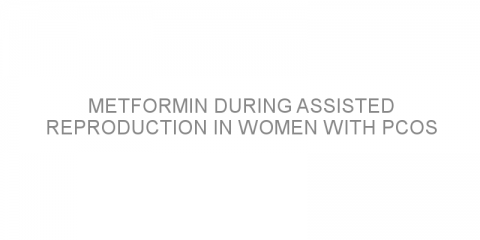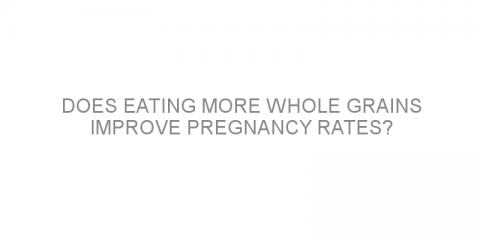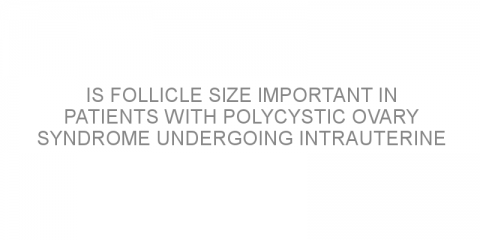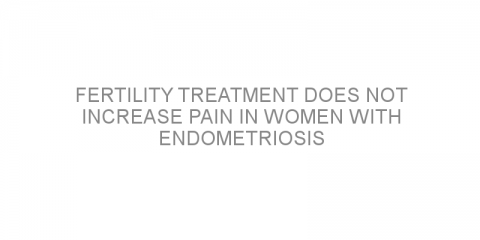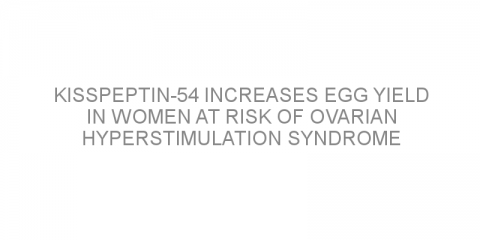In a nutshell This study compared progesterone injections with vaginal administration in women undergoing assisted reproductive techniques. Authors reported no significant differences across modes of administration in pregnancy rates, live birth rates, or complications. Some background The hormone progesterone is important for the successful...
Read MoreInfertility Posts on Medivizor
The effects of a low-glycemic index diet on pregnancy rates in overweight women with fertility issues
In a nutshell This study investigated the effects of a low calorie, low-glycemic index (a measure of the effect carbohydrate foods have on blood sugar hormone levels) diet on pregnancy rates in overweight women with infertility. The study showed that a low glycemic diet led to decreased weight and improved pregnancy rates. Some...
Read MoreHCG alone can complete follicle maturity in IVF treatments
In a nutshell This study explored the option of using low-dose human chorionic gonadotropin (hCG) alone to complete follicle maturity in natural cycle in vitro fertilization (IVF). The results showed that hCG alone could be used to complete follicle maturity. There was no requirement for follicle stimulating hormone (FSH). Some background...
Read MoreMetformin during assisted reproduction in women with PCOS
In a nutshell This study explored the impact of the drug metformin (Glucophage) on women with polycystic ovary syndrome (PCOS) who were undergoing assisted reproductive techniques (treatments to get pregnant). The study concluded that there was no firm evidence that birth rates increased by using metformin. Some background PCOS is a...
Read MoreIs tubal canalization an effective procedure to clear blocked fallopian tubes?
In a nutshell This study assessed whether tubal canalization (TC) was effective in treating blocked fallopian tubes. The study concluded that TC was a safe, effective, and minimally invasive way of unblocking fallopian tubes in certain cases. Some background Blocked fallopian tubes are common in women of reproductive age and can result in...
Read MoreDoes eating more whole grains improve pregnancy rates?
In a nutshell This study explored whether whole grain intake before in vitro fertilization improved pregnancy rates. The results showed that a higher intake of whole grains before IVF resulted in higher pregnancy rates. Some background Whole grains are very high in nutrients such as vitamins and fiber. They are thought to help reduce the risk...
Read MoreDo fibroids affect pregnancy rates in IVF?
In a nutshell This study explored the impact of fibroids on pregnancy rates during in vitro fertilization (IVF) treatment. The study concluded that fibroids which change the shape of the uterus may impact pregnancy rates. Otherwise, fibroids do not affect pregnancy rates in patients undergoing IVF fertility treatment. Some background IVF is...
Read MoreIs follicle size important in patients with polycystic ovary syndrome undergoing intrauterine insemination?
In a nutshell This study explored the impact of follicle size and endometrial thickness on pregnancy rates in women with polycystic ovarian syndrome (PCOS) undergoing ovarian stimulation and intrauterine insemination (a fertility treatment). The study concluded that pregnancy rates were not affected by follicle size or endometrial thickness. Some...
Read MoreFertility treatment does not increase pain in women with endometriosis
In a nutshell This study assessed whether women with endometriosis experienced more pain than disease-free women when undergoing fertility treatment. The results showed that fertility treatment did not worsen endometriosis symptoms or negatively impact quality of life in these women. Some background Endometriosis is a chronic disorder that causes...
Read MoreEndometrial thickness and pregnancy rates in IVF
In a nutshell This study explored the impact of endometrial thickness on pregnancy rates in patients undergoing in vitro fertilization (IVF). The study concluded that thin endometrial thickness adversely affects ongoing pregnancy rates. Some background Successful pregnancy rates vary widely among couples undergoing in-vitro fertilization (IVF)....
Read MoreFertility drugs and cancer risk
In a nutshell This study assessed the possible relationship between fertility drugs and cancer risk. The results showed a significant link between fertility drugs and thyroid cancer and melanomas, which requires further investigation. Some background Cancer is caused by abnormal cell growth. Fertility drugs, such as clomiphene citrate (Clomid),...
Read MoreKisspeptin-54 increases egg yield in women at risk of ovarian hyperstimulation syndrome
In a nutshell This study investigated whether kisspeptin-54 could be used to increase egg yield in women undergoing IVF and at risk of ovarian hyperstimulation syndome (OHSS). This study concluded that kisspeptin-54 effectively triggered ovulation with a low risk of OHSS. Some background Fertility drugs are drugs used to stimulate ovulation (when...
Read More


